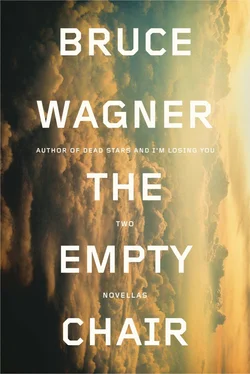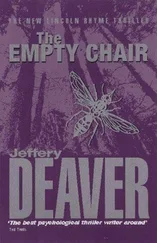He was standing in front of the empty chair.
Kura watched, head arched back in a pose of tranquil curiosity. He too was expecting to hear preliminary — introductory remarks.
Then, the oddest thing happened:
The man sat down.
In the milliseconds that followed, I pegged him as a prankster, a rodeo clown using the sacred chair as a slapstick prop to keep the impatient crowd at bay, perhaps to soften the blow of the announcement that the star attraction was ill, and satsang would be postponed until tomorrow. A sonic boom interrupted my fantasia. A delirium of voices —like the reversed film of a building that was demolished, rising back up, a demolished cathedral —a great edifice of rising voices knocked my freakin’ socks off. Outrageous decibels shattered the snow globe, ruptured my eardrums with joyful noise, blistering and rapturous. My reptilian brain reflexively commanded me to join the uproarious Hosanna! and I did.
Only Kura’s throat remained still. I know, because I never took my eyes off him.
His song would come later.

I’ve searched my mind and can’t remember a single thing the American said during satsang on that historic morning. But here’s what I know about the death of his teacher:
Usually, the old man would awaken at 4 a.m. and retreat to the den to offer benedictions to the saints who came before him. Lost in prayer, he would bow to the Source itself and meditate until seven. But on the day he left this world, he forsook routine…
The American had a routine too. He arrived at the tobacco shop each morning around the time that his teacher was finishing up. He made tea and chitchatted with Baba about goings-on at the track — this, that and the other. After a while the American would excuse himself to go downstairs, where he effected the gentle transformation of the lobby into a room suitable for satsang. He fetched the daily flowers left gratis on the sidewalk by vendors, placed them in vases then carefully swept up. Pulled flat pillows from a closet for attendees to sit on. Put up the altar, arranging coils of incense and sepia portraits of the toweled and diapered Masters of Advaita. Lifted the Great Guru’s well-oiled oak chair from its berth behind a display case, placing it front and center. Positioned a small table within the sadhu’s reach. Set a glass on the table then filled the pitcher with water, covering it with a linen napkin.
On a counter near the entrance he laid out the beautiful Mogul Lane Press editions of the Great Guru’s books, plus tapes of prior satsang, for sale. (I remember the volumes had the faint smell of cigars.) One of the last things he did was to set up a tape recorder and mic and make sure they were functioning properly. In the time remaining, he meditated, his awareness focussed by street sounds and the quality of changing light. He took care to notice his breath and the soft, jostling shadows of wayfarers already gathering outside. Their heads merged and migrated, like elephants in a herd.
At around 8:30, he let them in. The American could be warm or distant, depending on his mood. There were always the needy ones with inane questions: What time does satsang start? What time does it end? Is there satsang on Sundays? and so on. He tried accommodating those who wished to buy books or tapes but most transactions happened after the Q&A.
Close to 9 o’clock, he would return to the mezzanine. The American always had oatmeal, prune juice, and toast with jam. Usually his teacher was already seated, dipping hunks of bread into a glass of hot chocolate. During breakfast the Great Guru rarely spoke though he wasn’t above ribbing his tablemate’s devotion to prunes by letting loose a cognoscente’s barrage of farts. The American would smile but always managed to suppress a laugh, inciting the saint to new heights of gaseous devilry. As this was the designated time for the disciple to bring him up to speed on sundry household matters, the Kitchen Cabinet’s attendance was compulsory. The ladies were loath to endure these noisome bull sessions but that was how Baba, in his infinite wisdom, had arranged it. While the oompah-pah of cosmic flatus grew more flagrant (not fragrant!), the Cabineteers clucked like chickens, kneading their brows and wringing their aprons in protest, looking generally miserable. At quarter-past, with exaggerated politeness, the Great Guru would excuse himself to make his toilet. When at last he emerged rejuvenated, two of the heftier cousins assisted him downstairs. By then, the American would have taken his customary place at the foot of the chair. After a few bows before the altar, the Great Guru lowered himself, and satsang began.
But on that fateful day, the American overslept. It was the first time this ever happened and he reasoned that his body must have needed rest. Lately, he’d been more tired than usual; maybe he was coming down with something. What with his bookmaking — which referred to the horse and publishing enterprises in equal measure — and all the other jobs and duties thrown his way, he was stretched thin. Then he realized something with a start: he only dreamt he overslept. It was actually four in the morning and he lay in a pool of sweat.
He closed his eyes again and pushed himself to remember fragments of a dream… they were running on a track — the American and the Great Guru. His beloved teacher was being kicked by horses. Turning toward his disciple, he wore a spooky smile that the American had trouble interpreting. Was it an expression of transcendent equanimity? Or a plea for help? If the latter, his hands were tied; intuitively, he knew any offer of rescue would be turned away. Still, he wanted at least to make a face-saving gesture — in the dream, he felt responsible for his teacher’s suffering — but didn’t know how. The feeling of impotence, and the collateral violence, was nauseating. The horses kept kicking and kicking. He heard the sound of the saint’s ribs snapping, breaking through the skin… He smothered any further recollections by promptly sitting up. It was just too mortifying, too painful to know such brutality swam in the shallow, primordial waters of his consciousness, that he could claim ownership of a dream scenario that sponsored such sadism toward the man he loved above all others, the only being he would have died for! Such sadness and remorse… unbearable.
He leapt from drenched sheets to make tea but there wasn’t any — he’d forgotten to buy. Which seemed like another bad dream. While riffling the drawers and cupboards, he resolved to visit an acquaintance for counsel, a venerated Sufi healer who lived on the street. The dream was of the type that aroused atavistic fears and superstitions and the American wanted to learn if it was an omen; perhaps there were steps he could take to counteract its unsettling, cryptic prophesy. He decided to have tea at the tobacco shop — a perfect antidote to his anxieties. The presence of Baba would be a comfort and help ameliorate the aftershocks of his vision. The siddha would just have begun morning prayers.
The American knew he was ill. His sweatless skin wanted nothing to do with the sweet, pre-dawn air. Yet the worse he felt, the greater his relief — at least sickness offered an explanation for those schizoid racetrack phantasms.
Just a fever dream…
By the time he reached Mogul Lane, he was winded. He made sure to softly close the door behind him (not that he ever closed it any other way), mindful not to startle his teacher’s attendants — those from the second ring of the inner circle whose duty was to stand at post in the kitchen should the Great Guru call out for hot water with honey. Stranger things have happened, but a break-in was nearly unthinkable. Throughout the years there had never been an incident, not even of tomfoolery, nor had a single stem of the thousands upon thousands of roses left at the shop’s door been absconded with.
Читать дальше













